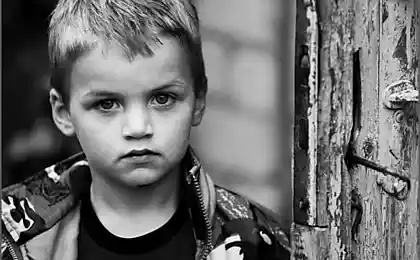255
The key to luck
Luck - chance, coincidence or openness of life?
“Lucky” and “losers” – what is the difference between them? Is luck a combination of circumstances or the ability to seize opportunities? Is it possible to purposefully attract fortune using different techniques?

Luck may seem synonymous with chance. But by calling someone lucky, we unwittingly belittle or even deny the importance of hard work and innate talent. How does he explain?Richard Wiseman.Professor of the discipline “public understanding of psychology” at the University of Herdfordshire (England), Lucky people have an amazing ability to be in the right place at the right time and enjoy the right luck that has fallen on them.
What are these people doing that we can’t? It turns out that “ability” is the keyword. Aside from a number of innate privileges or circumstances, the luckiest people have a set of skills that give them chances and opportunities along the way. Somehow they learned to turn the vicissitudes of fate in their favor.
Clarifying these skills is the central task of an individual project Christine Carter, Sociologist, Senior Research Fellow at the University of California, Berkeley. A few years ago, she ran online family courses aimed at building happier children. The results of such studies were a sense of gratitude, awareness and happiness that were quantifiable and which can be taught.

“From an academic point of view, I’ve always been somewhat skeptical of any concepts that involve luck,” Carter said. So, it turns out that all those children in Darfur (Darfur, the region of inter-ethnic conflict in western Sudan) are just not lucky? We know that other factors are at work.”
Carter then stumbled upon a study of the success factors that Wiseman was conducting. By the 1990s, he had embarked on an unusual project that involved experiments with two groups of people: “lucky impostors” and people who considered themselves losers, and tried to determine the difference between the two.
“His research is fun,” Carter says. He takes either potential losers or lucky ones and then flips a $20 check on their way. The lucky notice them and immediately pick up the find, while the unlucky do not.”
Such an organization of an experiment may seem like a silly and superficial way of determining luck and failure. But this is comparable to the results obtained by Wiseman through alternating experiments for 10 years from 1993 to 2003. He handed the newspaper to all the volunteers and asked them to count the number of photos. A large inscription on the half of the second page read: "Stop counting - there are 43 photographs in the newspaper." A similar headline was posted on another page: "Stop counting, just tell your experimenter you saw it and you'll get $250." The losers simply didn’t notice these inscriptions and kept counting.The experiment proved that luck is not a combination of circumstances, but the ability to use obvious opportunities, even if they appear unexpectedly.
Wiseman did not stop in his search. On the basis of his discoveries, he founded the so-called “school of luck”, which could teach techniques that attract fortune, consisting of such principles: Make the most of opportunities, listen to your intuition, take advantage of mistakes and believe only in the best.
His strategy also includes using meditation as a source of intuition, relaxation, and good thoughts, and meeting at least one stranger each week. A month later, he had followers, and 80 percent of them said that following these rules made them happy and lucky.
"I think if Wiseman was able to teach people how to catch fortune, you'll undoubtedly be able to instill those skills in your children, who will get other good side effects," Carter says, referring to improved social connections and a strong sense of gratitude. She has developed several basic strategies for parents when teaching children, which are: openness to new events (openness to learning), the ability to relax, make new acquaintances and talk to strangers without restrictions.All these techniques have one essential thing in common: to be physically and spiritually more open to the world around us.
It makes sense. The more attentive you are to your surroundings, the more likely you are to discover (capture) valuable information or avoid tragedy.
Lucky people attract new opportunities and accidents by no means magically. They're looking at it from the inside out, they're totally focused on the present. (This is especially true for people who stick to their screens and see nothing but them.)
It also means that anything that affects our physical or emotional ability to trust an event also affects our so-called "luckiness" - the same worries, for example. Anxiety physically and emotionally blocks our path to new opportunities.
416148
"If you're worried you can't find a parking spot, it suggests your vision is literally narrowed," Carter says. The more you worry, the faster you lose peripheral vision because your fight-or-flight mechanism creates a binocular vision of the event.
Excited people shift their focus to potential threats and predictably less likely to talk to strangers. “We teach our kids not to talk to strangers, and we teach them to be afraid of other people, which shuts them off from the opportunities that people might bring, and that creates anxiety,” Carter says.
Advocates of the “danger of strangers” may be stubborn, but the idea is relatively simple: reduce children’s fear and anxiety about meeting new people and therefore open them up to the lucrative connections that others can bring.
Carter found that by opening the minds of parents to the idea that luck could be learned, a lot changed. Carter herself admits that she has seen many anxious, anxious women, and learning these skills is not the easiest thing to do.. But once you do, she says, you can start to see the good in bad situations, which can improve your response to bad luck.
In the Huffinton Post, Carter writes: "Me and my kids love reading John Muth's Zen in Little Pants, which has one old parable about a farmer's son who broke his leg." When his neighbor said, “What a terrible bad luck!” the farmer replied, “Maybe.” Then, as it turned out, it was this broken leg that warned him against the coming war.
Credit Teresa LaFolla
P.S. And remember, just changing our consciousness – together we change the world!
Source: monocler.ru/klyuch-k-udache-otkryitoe-soznanie/
“Lucky” and “losers” – what is the difference between them? Is luck a combination of circumstances or the ability to seize opportunities? Is it possible to purposefully attract fortune using different techniques?

Luck may seem synonymous with chance. But by calling someone lucky, we unwittingly belittle or even deny the importance of hard work and innate talent. How does he explain?Richard Wiseman.Professor of the discipline “public understanding of psychology” at the University of Herdfordshire (England), Lucky people have an amazing ability to be in the right place at the right time and enjoy the right luck that has fallen on them.
What are these people doing that we can’t? It turns out that “ability” is the keyword. Aside from a number of innate privileges or circumstances, the luckiest people have a set of skills that give them chances and opportunities along the way. Somehow they learned to turn the vicissitudes of fate in their favor.
Clarifying these skills is the central task of an individual project Christine Carter, Sociologist, Senior Research Fellow at the University of California, Berkeley. A few years ago, she ran online family courses aimed at building happier children. The results of such studies were a sense of gratitude, awareness and happiness that were quantifiable and which can be taught.

“From an academic point of view, I’ve always been somewhat skeptical of any concepts that involve luck,” Carter said. So, it turns out that all those children in Darfur (Darfur, the region of inter-ethnic conflict in western Sudan) are just not lucky? We know that other factors are at work.”
Carter then stumbled upon a study of the success factors that Wiseman was conducting. By the 1990s, he had embarked on an unusual project that involved experiments with two groups of people: “lucky impostors” and people who considered themselves losers, and tried to determine the difference between the two.
“His research is fun,” Carter says. He takes either potential losers or lucky ones and then flips a $20 check on their way. The lucky notice them and immediately pick up the find, while the unlucky do not.”
Such an organization of an experiment may seem like a silly and superficial way of determining luck and failure. But this is comparable to the results obtained by Wiseman through alternating experiments for 10 years from 1993 to 2003. He handed the newspaper to all the volunteers and asked them to count the number of photos. A large inscription on the half of the second page read: "Stop counting - there are 43 photographs in the newspaper." A similar headline was posted on another page: "Stop counting, just tell your experimenter you saw it and you'll get $250." The losers simply didn’t notice these inscriptions and kept counting.The experiment proved that luck is not a combination of circumstances, but the ability to use obvious opportunities, even if they appear unexpectedly.
Wiseman did not stop in his search. On the basis of his discoveries, he founded the so-called “school of luck”, which could teach techniques that attract fortune, consisting of such principles: Make the most of opportunities, listen to your intuition, take advantage of mistakes and believe only in the best.
His strategy also includes using meditation as a source of intuition, relaxation, and good thoughts, and meeting at least one stranger each week. A month later, he had followers, and 80 percent of them said that following these rules made them happy and lucky.
"I think if Wiseman was able to teach people how to catch fortune, you'll undoubtedly be able to instill those skills in your children, who will get other good side effects," Carter says, referring to improved social connections and a strong sense of gratitude. She has developed several basic strategies for parents when teaching children, which are: openness to new events (openness to learning), the ability to relax, make new acquaintances and talk to strangers without restrictions.All these techniques have one essential thing in common: to be physically and spiritually more open to the world around us.
It makes sense. The more attentive you are to your surroundings, the more likely you are to discover (capture) valuable information or avoid tragedy.
Lucky people attract new opportunities and accidents by no means magically. They're looking at it from the inside out, they're totally focused on the present. (This is especially true for people who stick to their screens and see nothing but them.)
It also means that anything that affects our physical or emotional ability to trust an event also affects our so-called "luckiness" - the same worries, for example. Anxiety physically and emotionally blocks our path to new opportunities.
416148
"If you're worried you can't find a parking spot, it suggests your vision is literally narrowed," Carter says. The more you worry, the faster you lose peripheral vision because your fight-or-flight mechanism creates a binocular vision of the event.
Excited people shift their focus to potential threats and predictably less likely to talk to strangers. “We teach our kids not to talk to strangers, and we teach them to be afraid of other people, which shuts them off from the opportunities that people might bring, and that creates anxiety,” Carter says.
Advocates of the “danger of strangers” may be stubborn, but the idea is relatively simple: reduce children’s fear and anxiety about meeting new people and therefore open them up to the lucrative connections that others can bring.
Carter found that by opening the minds of parents to the idea that luck could be learned, a lot changed. Carter herself admits that she has seen many anxious, anxious women, and learning these skills is not the easiest thing to do.. But once you do, she says, you can start to see the good in bad situations, which can improve your response to bad luck.
In the Huffinton Post, Carter writes: "Me and my kids love reading John Muth's Zen in Little Pants, which has one old parable about a farmer's son who broke his leg." When his neighbor said, “What a terrible bad luck!” the farmer replied, “Maybe.” Then, as it turned out, it was this broken leg that warned him against the coming war.
Credit Teresa LaFolla
P.S. And remember, just changing our consciousness – together we change the world!
Source: monocler.ru/klyuch-k-udache-otkryitoe-soznanie/























